中西方饮食文化差异_英语
- 格式:ppt
- 大小:3.38 MB
- 文档页数:14


Differences between Chinese and Western diet culture Can you imagine the difference between the Western diet culture and the Chinese diet culture?First of all, I will introduce the general characteristics of Western diet culture. Western diet historyItaly cuisine is the originator of the Western diet culture, French cuisine is the Western diet culture king, American food is the Western diet culture upstart.Western food making skillsIn the production of the Western diet, they love the pursuit of perfection, but also attach importance to cooperation with a delicacy.Western diet varietiesThe famous dishes are Italy, French, American, German, Russian, etc. famous drinks include wine, coffee and black tea.Do you know,why there are so many differences between Chinese and Western diet culture ?just like the menu,western diet is very tidy and serious,but the Chinese is multifarious.Now, you have known the difference of the menu,but do you know why diet has a strong regional character?Actually, western diet due to geographical characteristics, environment, customs, appears in cooking methods ofdifferences in eating habits. People in western countries like to eat pizza, while Chinese people like to eat dumplings.Differences between Chinese and Western culture makes a difference of Chinese and Western food culture.事实上,西方饮食由于地域特色、环境、风俗习惯,出现烹调方法不同程度的差异。

English Essay: Differences in Chinese and Western Food CulturesThe world is a vast tapestry woven with diverse cultures, each contributing its unique hues to the grand narrative. Among these, the differences in Chinese and Western food cultures stand out prominently, reflecting not only distinct culinary traditions but also profound cultural values and lifestyles.Firstly, the focus of meals holds a significant divergence. In Western cuisine, meals tend to be centered around a main course, often accompanied by side dishes and dessert. This structure emphasizes the importance of the main dish, which is often a hearty meat-based meal. Conversely, Chinese dining culture embraces a more communal approach, where a variety of dishes are served simultaneously, encouraging sharing and a diverse dining experience. Each dish, no matter how small, is considered essential to the overall meal's harmony.Secondly, the use of ingredients and cooking techniques varies greatly. Western cooking heavily relies on dairy products, such as butter, cheese, and cream, which add richness and depth to dishes. Meat, especially beef and pork, is also a staple. Chinese cuisine, on the other hand, boasts a vast array of ingredients, including vegetables, seafood, tofu, and various spices and herbs. Cooking techniques like stir-frying, steaming, and braising are preferred, emphasizing the natural flavors of the ingredients and preserving their nutritional value.Moreover, the role of utensils and dining etiquette differs. In Western settings, knives, forks, and spoons are the norm, reflecting a more individualistic approach to dining. Dining etiquette emphasizes proper table manners and the proper use of utensils. In contrast, Chinese dining often involves chopsticks, which not only facilitate the consumption of a wide range of foods but also symbolize unity and harmony, as diners share from a common platter. Dining etiquette in China focuses on respect for elders, timely serving of food, and maintaining a lively conversation during meals.Lastly, the concept of balance and harmony is paramount in Chinese cuisine, whereas Western cuisine tends to emphasize individual flavors and textures. Chinese cooking adheres to the principles of traditional Chinese medicine, where foods are classified according to their properties (hot, cold, neutral) and their effects on the body. Meals are carefully balanced to promote health and well-being. Western cuisine, while also striving for flavor combinations, does not necessarily adhere to such holistic principles.In conclusion, the differences between Chinese and Western food cultures are deeply rooted in their respective histories, traditions, and philosophies. Thesevariations not only enrich our dining experiences but also offer insights into the diverse ways in which cultures around the world approach food, nutrition, and social interaction.中文翻译:中西方饮食文化的差异世界是一幅由多元文化交织而成的壮丽画卷,每种文化都为这幅画卷增添了独特的色彩。
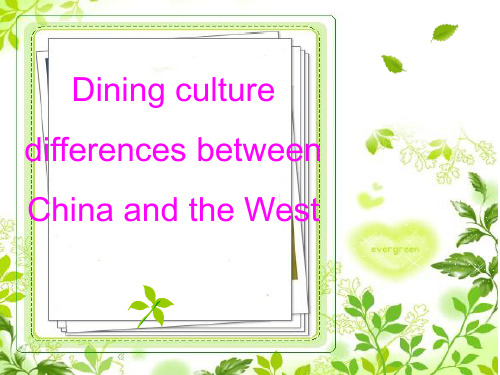
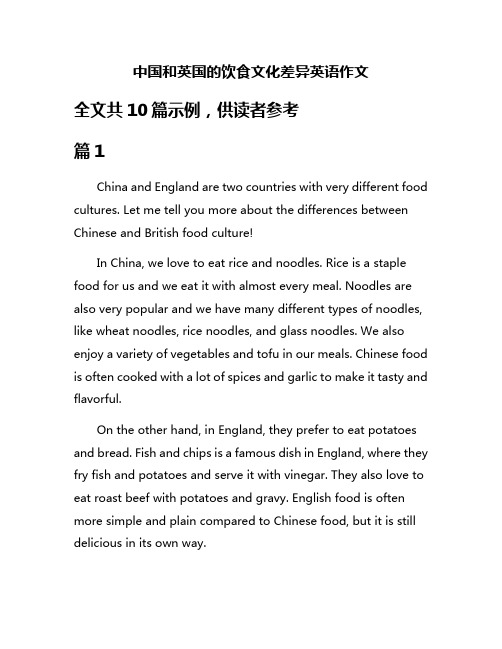
中国和英国的饮食文化差异英语作文全文共10篇示例,供读者参考篇1China and England are two countries with very different food cultures. Let me tell you more about the differences between Chinese and British food culture!In China, we love to eat rice and noodles. Rice is a staple food for us and we eat it with almost every meal. Noodles are also very popular and we have many different types of noodles, like wheat noodles, rice noodles, and glass noodles. We also enjoy a variety of vegetables and tofu in our meals. Chinese food is often cooked with a lot of spices and garlic to make it tasty and flavorful.On the other hand, in England, they prefer to eat potatoes and bread. Fish and chips is a famous dish in England, where they fry fish and potatoes and serve it with vinegar. They also love to eat roast beef with potatoes and gravy. English food is often more simple and plain compared to Chinese food, but it is still delicious in its own way.Another difference is that in China, we like to eat our meals with chopsticks, while in England, they use fork and knife. It can be a bit tricky to use chopsticks at first, but once you get the hang of it, it's really fun!Overall, both Chinese and British food cultures have their own unique flavors and traditions. It's interesting to see how different countries have different ways of preparing and enjoying food. Whether you prefer Chinese noodles or British fish and chips, there's something for everyone to enjoy!篇2China and Britain are two countries with very different food cultures. Let's take a look at some of the differences between Chinese and British food cultures.In China, people eat a lot of rice. Rice is a staple food in China, and it is served with almost every meal. In Britain, on the other hand, people eat a lot of bread. Bread is a staple food in Britain, and it is served with almost every meal.In China, people eat a lot of vegetables. Vegetables are a big part of Chinese cuisine, and they are usually stir-fried or steamed. In Britain, people eat a lot of meat. Meat is a big part of British cuisine, and it is usually roasted or grilled.In China, people eat a lot of noodles. Noodles are a popular dish in China, and they are served in many different ways. In Britain, people eat a lot of potatoes. Potatoes are a popular dish in Britain, and they are served boiled, mashed, or fried.In China, people drink a lot of tea. Tea is a big part of Chinese culture, and it is served with almost every meal. In Britain, people drink a lot of tea too, but they also drink a lot of coffee. Coffee is a big part of British culture, and it is served with almost every meal.Overall, the food cultures of China and Britain are very different. Each country has its own unique dishes and traditions, which make eating in China and Britain a truly special experience.篇3Oh, hi there! Today I'm gonna talk about the differences between Chinese and British food culture. It's gonna be super interesting, trust me!So, in China, food is like super important. We have so many delicious dishes like dumplings, noodles, and rice. We love to eat together with our family and friends, and we always make sure there's enough food for everyone. And we use chopsticks to eat, which is totally cool!But in Britain, they have different food culture. They love their tea and scones, and fish and chips. They also have this thing called a roast dinner, where they eat roast meat like chicken or beef with potatoes and veggies. And they like to have a cup of tea with milk in the afternoon, which is kinda weird but also kinda nice.Another big difference is the way we eat. In China, we like to eat our food hot and fresh, and we use a lot of spices and sauces to make it tasty. But in Britain, they prefer their food more plain and simple, without too many seasonings. They also eat a lot of bread and cheese, which we don't really have in China.Overall, both Chinese and British food cultures are super cool in their own way. It's really interesting to see how different countries have their own unique food traditions. I hope you learned something new today! Thanks for reading, bye!篇4Oh, hi everyone! Today I want to talk about the differences between Chinese and British food culture! It's super interesting, trust me!First of all, let's talk about breakfast. In China, we love to eat congee, fried dough sticks, and steamed buns for breakfast. It'sso yummy! But in the UK, they usually have cereal, toast, and maybe some eggs and bacon. It's quite different, right?Next, let's talk about tea time. In China, we like to have tea and maybe some snacks like dumplings or mooncakes. But in the UK, they have afternoon tea with scones, sandwiches, and cakes. It's so fancy!And for dinner, Chinese people usually eat rice or noodles with veggies and meat. We love to share dishes with our family and friends. But in the UK, they might have roast beef with potatoes and gravy. It's a big meal!Oh, and don't forget about desserts! In China, we have sweet treats like red bean buns and mango pudding. But in the UK, they love their puddings like sticky toffee pudding and apple crumble. It's so tasty!So, you see, there are lots of differences between Chinese and British food culture. But both countries have delicious food that you should try! Maybe you can have a Chinese takeaway one day and then try some traditional British dishes the next. It's a tasty adventure!That's all for now, see you next time! Bye bye!篇5Hello everyone! Today I'm going to talk about the differences between Chinese and British food culture.First of all, let's talk about Chinese food. Chinese people love to eat rice, noodles, and lots of vegetables. We also like to eat a lot of different types of meat, like pork, beef, and chicken. Some popular Chinese dishes include dumplings, fried rice, and hot pot. We also have a tradition of drinking tea with our meals.On the other hand, British food is quite different. British people love to eat things like fish and chips, roast beef with Yorkshire pudding, and bangers and mash. They also love to eat desserts like scones with clotted cream and jam, and sticky toffee pudding. British people often drink tea with milk, or coffee with their meals.Another big difference between Chinese and British food culture is the way meals are served. In China, we usually have a family-style meal, where everyone shares dishes. In Britain, meals are served in courses, starting with a starter, then a main course, and finally dessert.Overall, both Chinese and British food cultures are unique and delicious in their own ways. It's fun to try new foods from different cultures and see how they differ from the food we'reused to. I hope you enjoyed learning about these differences! Thanks for reading!篇6Hey guys! Today, let's talk about the differences between Chinese and British food culture. Are you ready? Let's go!First of all, let's talk about Chinese food. In China, people love to eat rice and noodles. We also eat a lot of vegetables and fruits. Chinese food is very diverse and each region has its own special dishes. Some famous Chinese dishes are dumplings, Kung Pao chicken, and Peking duck. Yum!On the other hand, British food is quite different. In Britain, people eat a lot of meat and potatoes. Some popular British dishes are fish and chips, roast beef, and shepherd's pie. In Britain, people also love to drink tea. Afternoon tea is a very popular tradition in Britain.Another difference between Chinese and British food culture is the way meals are served. In China, meals are servedfamily-style, which means that everyone shares dishes. In Britain, meals are served individually, with each person getting their own plate of food.Overall, Chinese and British food cultures are quite different but both are delicious in their own way. So next time you have the chance, try some Chinese and British food and see which one you like better. Bon appétit!篇7Hey guys! Today, let's talk about the differences between Chinese and British food culture. It's super interesting, so listen up!First of all, let's talk about Chinese food. In China, we love to eat rice, noodles, and dumplings. And oh my goodness, the flavors are out of this world! We have so many different dishes with yummy sauces and spices. Plus, we eat with chopsticks, which is so fun!But in Britain, they love their fish and chips. Can you believe it? They fry fish and potatoes and eat it with vinegar. It's totally different from our food, but I bet it's tasty too. And they use knives and forks to eat, not chopsticks like us.Another big difference is the way we eat together. In China, we love to share dishes with our family and friends. It's all about sharing and caring. But in Britain, everyone has their own plate of food. They don't share like we do.And don't even get me started on dessert! In China, we have sweet buns, rice cakes, and fruit for dessert. But in Britain, they love their puddings like apple crumble and custard. It's so different from what we eat, but I bet it's delicious.Overall, Chinese and British food cultures are so different, but both are amazing in their own way. So let's keep enjoying all the tasty food from around the world!That's all for today, guys. I hope you learned something new about Chinese and British food culture. Bye!篇8China and the UK are two countries with very different food cultures. In China, we love to eat rice, noodles, and dumplings. These are some of our staple foods that we eat almost every day. We also enjoy dishes like Kung Pao chicken, Peking duck, and hot pot. These dishes are full of flavor and very delicious.In the UK, people eat a lot of different foods than we do in China. They love to eat fish and chips, roast beef, and shepherd's pie. They also enjoy desserts like scones, Victoria sponge cake, and trifle. The food in the UK is quite different from what we are used to, but it is still very tasty.One big difference between Chinese and British food culture is the way we eat our meals. In China, we like to eat family-style, where everyone shares dishes from the middle of the table. This creates a sense of community and togetherness. In the UK, people tend to eat their own individual meal without sharing. This can sometimes feel a bit lonely, but it is just a different way of eating.Another difference is the use of spices and seasonings. Chinese food is often very flavorful and spicy, with lots of garlic, ginger, and soy sauce. British food, on the other hand, is more subtle in its flavors, with a focus on herbs like parsley and thyme. Some people in the UK find Chinese food too spicy, while some Chinese people may find British food a bit bland.Overall, both Chinese and British food cultures have their own unique flavors and traditions. It is interesting to learn about the differences and similarities between the two, and to try new foods from different cultures. Food is a big part of our lives, and it is a great way to connect with people from around the world. Let's keep enjoying delicious food together!篇9China and Britain have very different food cultures. Let me tell you about the differences!First of all, in China, we love to eat rice as our staple food. Rice is the most important part of our meals. We also eat a lot of noodles, dumplings, and steamed buns. These foods are delicious and very filling. In Britain, they eat a lot of bread and potatoes. They love to have sandwiches for lunch and potatoes with their meals. They also enjoy fish and chips, which is a popular dish in Britain.Another big difference is the way we eat our meals. In China, we use chopsticks to eat our food. Chopsticks are long, thin sticks that we use to pick up our food. In Britain, they use knives and forks to eat. They cut their food into small pieces and then use their forks to eat. It's very different from how we eat in China!In China, we also have a lot of different types of tea that we drink with our meals. We have green tea, black tea, oolong tea, and many other varieties. In Britain, they drink a lot of black tea with milk and sugar. They also love to have afternoon tea with sandwiches and scones.Overall, China and Britain have very different food cultures. But both countries have delicious and unique dishes that areloved by their people. It's fun to learn about the food traditions of different countries!篇10Chinese and British food cultures are different in many ways. Let's explore these differences and see how they make each country's food unique!In China, we love noodles, dumplings, and rice. Noodles can be found in all shapes and sizes, and we like to slurp them up quickly. Dumplings are stuffed with meat or vegetables and are boiled or fried. They are so yummy! Rice is a staple food in China, and we eat it with almost every meal.On the other hand, in Britain, they love their fish and chips. Fish is usually battered and deep-fried, served with crispy fries. It's a popular dish that you can find at many pubs and restaurants. They also enjoy their pies, like meat pies or shepherd's pies. They are hearty and delicious!Chinese people enjoy tea with their meals, while British people prefer a cup of black tea or coffee. Both countries have their own unique desserts too. In China, we have sweet red bean soup or tangyuan (glutinous rice balls). In Britain, they love their scones with clotted cream and jam, or sticky toffee pudding.Overall, both Chinese and British food cultures have their own specialties and flavors that make them special. It's fun to try new foods from different countries and see how they can be so different yet so delicious! Let's celebrate the diversity in food cultures and enjoy the tasty dishes each country has to offer. Yum yum!。
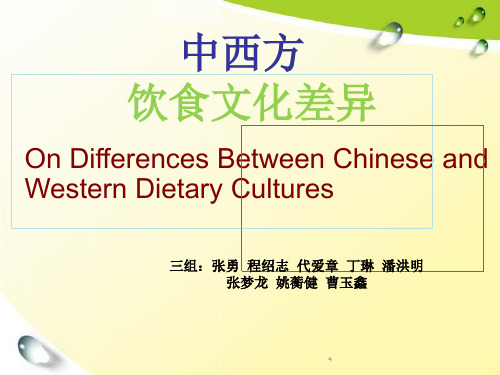

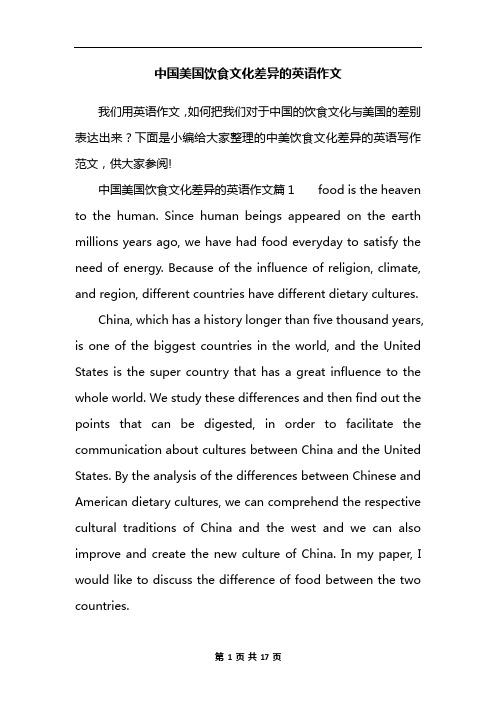
中国美国饮食文化差异的英语作文我们用英语作文,如何把我们对于中国的饮食文化与美国的差别表达出来?下面是小编给大家整理的中美饮食文化差异的英语写作范文,供大家参阅!中国美国饮食文化差异的英语作文篇1 food is the heaven to the human. Since human beings appeared on the earth millions years ago, we have had food everyday to satisfy the need of energy. Because of the influence of religion, climate, and region, different countries have different dietary cultures.China, which has a history longer than five thousand years, is one of the biggest countries in the world, and the United States is the super country that has a great influence to the whole world. We study these differences and then find out the points that can be digested, in order to facilitate the communication about cultures between China and the United States. By the analysis of the differences between Chinese and American dietary cultures, we can comprehend the respective cultural traditions of China and the west and we can also improve and create the new culture of China. In my paper, I would like to discuss the difference of food between the two countries.中国美国饮食文化差异的英语作文篇2 Hello , everyone we are very proud to introduce our topic . my name is huangxiaolong ,he is jiangzhihui ,he is lihuan .lets begin. Our topic is Differences Between Chinese And Western Food. cultural differences between East and West created a difference in food culture。
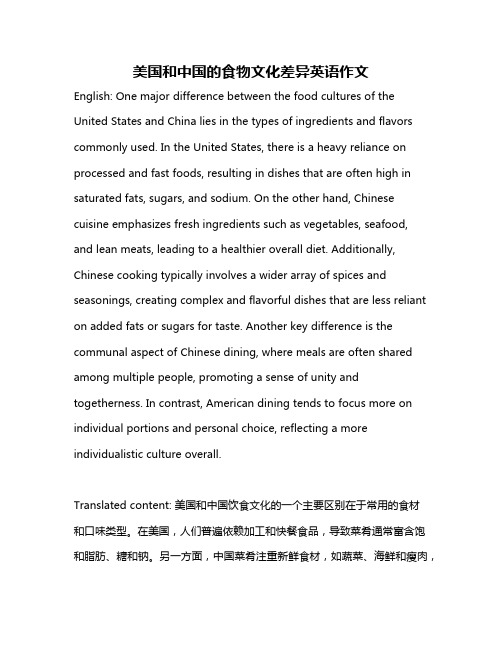
美国和中国的食物文化差异英语作文English: One major difference between the food cultures of the United States and China lies in the types of ingredients and flavors commonly used. In the United States, there is a heavy reliance on processed and fast foods, resulting in dishes that are often high in saturated fats, sugars, and sodium. On the other hand, Chinese cuisine emphasizes fresh ingredients such as vegetables, seafood,and lean meats, leading to a healthier overall diet. Additionally, Chinese cooking typically involves a wider array of spices and seasonings, creating complex and flavorful dishes that are less reliant on added fats or sugars for taste. Another key difference is the communal aspect of Chinese dining, where meals are often shared among multiple people, promoting a sense of unity and togetherness. In contrast, American dining tends to focus more on individual portions and personal choice, reflecting a more individualistic culture overall.Translated content: 美国和中国饮食文化的一个主要区别在于常用的食材和口味类型。

中西方饮食习惯差异英语作文【篇一:中西方饮食文化差异英文版】the western diet culture differencewestern diet due to geographical characteristics, influence of climate factors such as environment, customs, appears in the ingredients, flavors, cooking methods, different degrees of differences in eating habits. it is because of these differences, diet has a strong regional character. differences between chinese and western culture makes a difference of chinese and western food culture, and this difference from the west in ways of thinking and policy. chinese focus on heaven, westerners focus on people-oriented.nutrition and delicious(营养与美味)due to west philosophy thought of different, westerners yu diet heavy science, heavy science is emphasizes nutrition, so western diet to nutrition for highest guidelines, eating like for a bio of machine added fuel, special emphasizes food of nutrition components, protein, and fat, and carbohydrates, and vitamin and the various inorganic elements of content is match expedient, calories of supply is right, and these nutrition components is can for eating who full absorption, has no other side effects. knowledge of these problems are cooking, and how color,fragrance and taste of the dishes, it is first requested. sanhedrin premier diet in western countries--france, its food culture in many ways and weapproximate, but access to nutritional problems, will open the distance between the two sides.five flavors mixed with the operation aimed at the pursuit ofdelicious cooking in china, during the processing of the hot frying and slow fire attack for a long time may cause destruction of the nutritional components of food. france is also the pursuit of delicious cooking, but at the same time not forgetting nutrition that premise, consistently delicious is that they do not care nutrition for the taking. especially modern cooking trends occurred in the 1960 of the 20th century, with special emphasis on health, diet, to the pursuit of light oil,emphasized the use of fresh raw materials, stressed during the cooking process tomaintain original nutrition and taste, so vegetables are eaten raw. so that the western diet nutrition is universal。
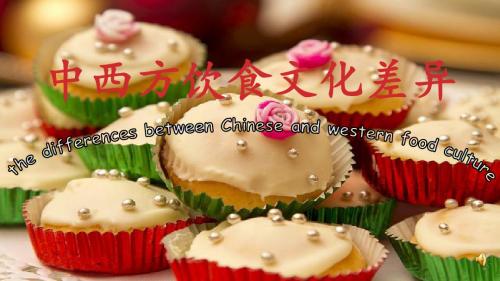

Differences between Chinese and Western diet culture Can you imagine the difference between the Western diet culture and the Chinese diet culture?First of all, I will introduce the general characteristics of Western diet culture. Western diet historyItaly cuisine is the originator of the Western diet culture, French cuisine is the Western diet culture king, American food is the Western diet culture upstart.Western food making skillsIn the production of the Western diet, they love the pursuit of perfection, but also attach importance to cooperation with a delicacy.Western diet varietiesThe famous dishes are Italy, French, American, German, Russian, etc. famous drinks include wine, coffee and black tea.Do you know,why there are so many differences between Chinese and Western diet culture ?just like the menu,western diet is very tidy and serious,but the Chinese is multifarious.Now, you have known the difference of the menu,but do you know why diet has a strong regional character?Actually, western diet due to geographical characteristics, environment, customs, appears in cooking methods ofdifferences in eating habits. People in western countries like to eat pizza, while Chinese people like to eat dumplings.Differences between Chinese and Western culture makes a difference of Chinese and Western food culture.事实上,西方饮食由于地域特色、环境、风俗习惯,出现烹调方法不同程度的差异。

English Version: Differences in Food Culture Between China and the West The culinary landscapes of China and the West are vast and diverse, each reflecting the rich histories, traditions, and lifestyles of their respective cultures. These differences extend beyond mere ingredients and cooking techniques; they encompass a deep-seated understanding of food as a means of communication, celebration, and nourishment. In this essay, we will explore some of the most notable distinctions between Chinese and Western food cultures.1. Ingredients and FlavorsChinese cuisine is renowned for its variety of ingredients and intricate flavor profiles. Fresh vegetables, meats, seafood, and a wide array of spices and herbs are used to create dishes that are often bold, complex, and harmonious in taste. Contrastingly, Western cuisine, while equally diverse, tends to emphasize meat and dairy products as the foundation of many dishes. Flavors are often more straightforward, with a focus on balancing sweet, sour, salty, and bitter tastes. 2. Cooking TechniquesChinese cooking employs a myriad of techniques, from stir-frying and steaming to braising and deep-frying. These methods are designed to preserve the natural flavors and textures of ingredients while enhancing their overall appeal. Western cuisine, on the other hand, favors techniques such as baking, grilling, and roasting, which often result in dishes with a distinct crust or exterior texture.3. Meal StructureIn China, meals are typically structured around a main dish, often accompanied by a variety of side dishes, soups, and rice or noodles. This approach emphasizes balance and variety within a single meal. Western meals, however, tend to follow a more structured course system, with appetizers, main courses, and desserts served sequentially. This sequence allows for a more deliberate progression of flavors and textures throughout the dining experience.4. Dining CustomsDining customs in China often involve communal eating, where dishes are shared among diners. This practice fosters a sense of camaraderie and encourages conversation. In contrast, Western dining customs often involve individual plates and utensils, reflecting a greater emphasis on personal space and privacy during meals.5. Role of Food in CultureFood plays a central role in both Chinese and Western cultures, but its significance differs. In China, food is often seen as a means of expressing hospitality, respect, and affection. It is a fundamental aspect of social gatherings and celebrations, where the quality and variety of dishes served reflect the importance of the occasion. In Western cultures, food is also valued, but its role in social interactions may be more nuanced. It is often used to mark specialoccasions, but daily meals are not necessarily imbued with the same level of cultural significance.Chinese Translation: 中西方饮食文化的差异中西方饮食文化各具特色,反映了各自丰富的历史、传统和生活方式。

Differences in Chinese and Western Food Cultures (英语作文) The vast tapestry of global cultures is woven with intricate threads of tradition, and nowhere is this more evident than in the diverse landscapes of culinary arts. Chinese and Western food cultures, each steeped in rich histories and distinct customs, offer a fascinating contrast that illuminates the profound differences between East and West.Firstly, the emphasis on mealtime rituals and social gatherings sets these two cultures apart. In China, dining is often a communal affair, where family and friends gather around a table laden with an array of delicacies, each dish meticulously prepared to showcase the chef's culinary prowess. Conversations flow freely, and the act of sharing food symbolizes unity and harmony. In contrast, Western dining culture tends to be more individualistic, with plated meals served to each diner. Mealtimes, while still social occasions, often revolve around smaller gatherings and more focused conversations.Secondly, the use of ingredients and cooking techniques varies greatly. Chinese cuisine is renowned for its use of a wide variety of fresh ingredients, including meats, seafood, vegetables, herbs, and spices. Techniques such as stir-frying, steaming, braising, and deep-frying are employed to bring out the natural flavors and textures of these ingredients. Western cuisine, on the other hand, while also diverse, tends to rely more heavily on dairy products, grains, and meats, with a focus on baking, roasting, grilling, and sautéing as primary cooking methods.Furthermore, the concept of balance and harmony plays a pivotal role in Chinese cuisine. The Five Flavors (sweet, sour, bitter, spicy, and salty) and the Four Seasons (with their corresponding ingredients) are carefully considered to create dishes that are not only delicious but also believed to promote health and well-being. Western cuisine, while also striving for flavor balance, does not adhere to such a strict philosophical framework.Lastly, the role of dining in daily life differs. In China, meals are often seen as opportunities for relaxation and bonding, with breakfast, lunch, and dinner each carrying their own significance and rituals. Western cultures, however, tend to prioritize efficiency and convenience, with fast food and take-out options becoming increasingly popular. This has led to a shift in dining habits, where meals are sometimes consumed on-the-go or in front of screens.中文翻译:全球文化的广阔画卷由传统这一错综复杂的丝线编织而成,而在烹饪艺术的多样景观中,这一点尤为明显。